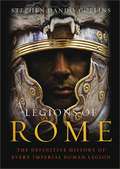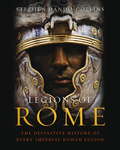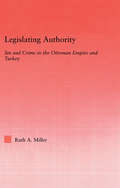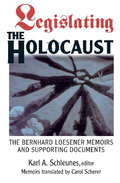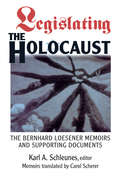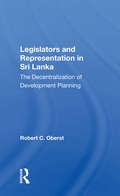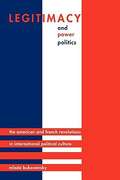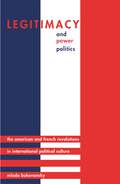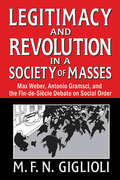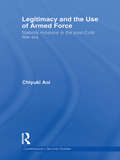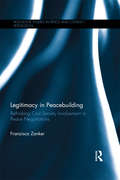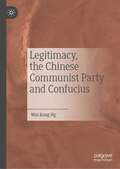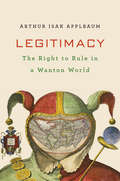- Table View
- List View
Legions of Rome
by Stephen Dando-CollinsNo book on Roman history has attempted to do what Stephen Dando-Collins does in Legions of Rome: to provide a complete history of every Imperial Roman legion and what it achieved as a fighting force. The author has spent the last thirty years collecting every scrap of available evidence from numerous sources: stone and bronze inscriptions, coins, papyrus and literary accounts in a remarkable feat of historical detective work.The book is divided into three parts: Part 1 provides a detailed account of what the legionaries wore and ate, what camp life was like, what they were paid and how they were motivated and punished. The section also contains numerous personal histories of individual soldiers. Part 2 offers brief unit histories of all the legions that served Rome for 300 years from 30BC. Part 3 is a sweeping chronological survey of the campaigns in which the armies were involved, told from the point of view of particular legions.Lavish, authoritative and beautifully produced, Legions of Rome will appeal to ancient history enthusiasts and military history buffs alike.
Legions of Rome: The definitive history of every Roman legion
by Stephen Dando-CollinsNo book on Roman history has attempted to do what Stephen Dando-Collins does in Legions of Rome: to provide a complete history of every Imperial Roman legion and what it achieved as a fighting force. The author has spent the last thirty years collecting every scrap of available evidence from numerous sources: stone and bronze inscriptions, coins, papyrus and literary accounts in a remarkable feat of historical detective work. The book is divided into three parts: Part 1 provides a detailed account of what the legionaries wore and ate, what camp life was like, what they were paid and how they were motivated and punished. The section also contains numerous personal histories of individual soldiers. Part 2 offers brief unit histories of all the legions that served Rome for 300 years from 30BC. Part 3 is a sweeping chronological survey of the campaigns in which the armies were involved, told from the point of view of particular legions. Lavish, authoritative and beautifully produced, Legions of Rome will appeal to ancient history enthusiasts and military history buffs alike.
Legions of Rome: The definitive history of every Roman legion
by Stephen Dando-CollinsNo book on Roman history has attempted to do what Stephen Dando-Collins does in Legions of Rome: to provide a complete history of every Imperial Roman legion and what it achieved as a fighting force. The author has spent the last thirty years collecting every scrap of available evidence from numerous sources: stone and bronze inscriptions, coins, papyrus and literary accounts in a remarkable feat of historical detective work. The book is divided into three parts: Part 1 provides a detailed account of what the legionaries wore and ate, what camp life was like, what they were paid and how they were motivated and punished. The section also contains numerous personal histories of individual soldiers. Part 2 offers brief unit histories of all the legions that served Rome for 300 years from 30BC. Part 3 is a sweeping chronological survey of the campaigns in which the armies were involved, told from the point of view of particular legions. Lavish, authoritative and beautifully produced, Legions of Rome will appeal to ancient history enthusiasts and military history buffs alike.
Legislating Authority: Sin and Crime in the Ottoman Empire and Turkey
by Ruth MillerLegislation Authority addresses issues of law, state violence, and state authority within the Ottoman and Turkish context.
Legislating Instability: Adam Smith, Free Banking, and the Financial Crisis of 1722
by Tyler Beck GoodspeedFrom 1716 to 1845 Scottish banks were among the most dynamic and resilient in Europe, effectively absorbing economic shocks that rocked markets in London and on the continent. Tyler Beck Goodspeed explains the paradox that Scotland’s banking system achieved this success without the regulations Adam Smith considered necessary for economic stability.
Legislating The Holocaust
by Karl SchleunesFrom April 1933 to early 1943, Bernard Loesener served as the official "Jewish Expert" in the German Third Reich's Ministry of the Interior, the government body responsible for the Nazi's legislative assault on German Jewry. In that role, he personally drafted much of the legislation, the Nuremberg Laws of 1935 preeminently, that gradually dispossessed, disenfranchised, and dehumanized the Jews of Nazi Germany. During the first six years of Nazi rule, the seminal period of government-sponsored anti-Semitism, Loesener kept the minutes of many crucial, high-level, inter-ministerial conferences concerned with the "Jewish Question." As observer and participant, his experiences were virtually unparalleled. In 1950, Loesener penned a memoir that sought to explain, and justify, his actions during the ten-year escalation of Nazi oppression that resulted, to Loesener's professed horror, in the Final Solution. It was published in 1961, in German, by the journal Vierteljahrshefte fuer Zeitgeschichte. It has never before appeared in English, until now - in Legislating the Holocaust.
Legislating The Holocaust: The Bernhard Loesenor Memoirs And Supporting Documents
by Karl SchleunesFrom April 1933 to early 1943, Bernard Loesener served as the official ?Jewish Expert? in the German Third Reich's Ministry of the Interior, the government body responsible for the Nazi's legislative assault on German Jewry. In that role, he personally drafted much of the legislation, the Nuremberg Laws of 1935 preeminently, that gradually dispossessed, disenfranchised, and dehumanized the Jews of Nazi Germany. During the first six years of Nazi rule, the seminal period of government-sponsored anti-Semitism, Loesener kept the minutes of many crucial, high-level, inter-ministerial conferences concerned with the ?Jewish Question.? As observer and participant, his experiences were virtually unparalleled. In 1950, Loesener penned a memoir that sought to explain, and justify, his actions during the ten-year escalation of Nazi oppression that resulted, to Loesener's professed horror, in the Final Solution. It was published in 1961, in German, by the journal Vierteljahrshefte fuer Zeitgeschichte. It has never before appeared in English, until now - in Legislating the Holocaust.
Legislating the Holocaust: The Bernhard Loesener Memoirs and Supporting Documents
by Karl A. SchleunesFrom April 1933 to early 1943, Bernard Loesener served as the official "Jewish Expert" in the German Third Reich's Ministry of the Interior, the government body responsible for the Nazi's legislative assault on German Jewry. In that role, he personally drafted much of the legislation, the Nuremberg Laws of 1935 preeminently, that gradually dispossessed, disenfranchised, and dehumanized the Jews of Nazi Germany. During the first six years of Nazi rule, the seminal period of government-sponsored anti-Semitism, Loesener kept the minutes of many crucial, high-level, inter-ministerial conferences concerned with the "Jewish Question. " As observer and participant, his experiences were virtually unparalleled. In 1950, Loesener penned a memoir that sought to explain, and justify, his actions during the ten-year escalation of Nazi oppression that resulted, to Loesener's professed horror, in the Final Solution. It was published in 1961, in German, by the journal Vierteljahrshefte fuer Zeitgeschichte. It has never before appeared in English, until now - in Legislating the Holocaust.
Legislative Effectiveness in the United States Congress
by Craig Volden Alan E. WisemanThis book explores why some members of Congress are more effective than others at navigating the legislative process and what this means for how Congress is organized and what policies it produces. Craig Volden and Alan E. Wiseman develop a new metric of individual legislator effectiveness (the Legislative Effectiveness Score) that will be of interest to scholars, voters, and politicians alike. They use these scores to study party influence in Congress, the successes or failures of women and African Americans in Congress, policy gridlock, and the specific strategies that lawmakers employ to advance their agendas.
Legislator Success in Fragmented Congresses in Argentina
by Ernesto Calvo"Plurality-led Congresses are among the most pervasive and least studied phenomena in presidential systems around the world. Often conflated with divided government, where an organized opposition controls a majority of seats in congress, plurality-led congresses are characterized by a party with fewer than 50 percent of the seats still in control of the legislative gates. Extensive gatekeeping authority without plenary majorities, this book shows, leads to policy outcomes that are substantially different from those observed in majority-led congresses. Through detailed analyses of legislative success in Argentina and Uruguay, this book explores the determinants of law enactment in fragmented congresses. It describes in detail how the lack of majority support explains legislative success in standing committees, the chamber directorate, and the plenary floor"--
Legislators And Representation In Sri Lanka: The Decentralization Of Development Planning
by Robert C. OberstFocusing on the work of Sri Lankan legislators, this book offers a model of representation in examining parliamentary systems, especially those found in the Third World. It explores an important part of legislators' responsibilities as the country seeks to decentralize its development planning.
Legislators, Leaders, and Lawmaking: The U. S. House of Representatives in the Postreform Era
by Barbara SinclairRecently plagued by gridlock, huge deficits, and deep policy differences between the president and congressional majorities, Congress has often been the target of relentless and bitter criticism. In this context, Sinclair asks, how has the House not only performed its legislative functions but also managed to enhance its role in the American political system? In Legislators, Leaders, and Lawmakers, Sinclair traces the emergence of a House majority party leadership that is highly active and deeply involved in multiple aspects of the legislative process, and yet one that leads by means of a participatory and inclusive style.
Legitimacy and Power Politics: The American and French Revolutions in International Political Culture
by Mlada BukovanskyThis book examines the causes and consequences of a major transformation in both domestic and international politics: the shift from dynastically legitimated monarchical sovereignty to popularly legitimated national sovereignty. It analyzes the impact of Enlightenment discourse on politics in eighteenth-century Europe and the United States, showing how that discourse facilitated new authority struggles in Old Regime Europe, shaped the American and French Revolutions, and influenced the relationships between the revolutionary regimes and the international system. The interaction between traditional and democratic ideas of legitimacy transformed the international system by the early nineteenth century, when people began to take for granted the desirability of equality, individual rights, and restraint of power. Using an interpretive, historically sensitive approach to international relations, the author considers the complex interplay between elite discourses about political legitimacy and strategic power struggles within and among states. She shows how culture, power, and interests interacted to produce a crucial yet poorly understood case of international change. The book not only shows the limits of liberal and realist theories of international relations, but also demonstrates how aspects of these theories can be integrated with insights derived from a constructivist perspective that takes culture and legitimacy seriously. The author finds that cultural contests over the terms of political legitimacy constitute one of the central mechanisms by which the character of sovereignty is transformed in the international system--a conclusion as true today as it was in the eighteenth century.
Legitimacy and Power Politics: The American and French Revolutions in International Political Culture (Princeton Studies in International History and Politics #120)
by Mlada BukovanskyThis book examines the causes and consequences of a major transformation in both domestic and international politics: the shift from dynastically legitimated monarchical sovereignty to popularly legitimated national sovereignty. It analyzes the impact of Enlightenment discourse on politics in eighteenth-century Europe and the United States, showing how that discourse facilitated new authority struggles in Old Regime Europe, shaped the American and French Revolutions, and influenced the relationships between the revolutionary regimes and the international system. The interaction between traditional and democratic ideas of legitimacy transformed the international system by the early nineteenth century, when people began to take for granted the desirability of equality, individual rights, and restraint of power. Using an interpretive, historically sensitive approach to international relations, the author considers the complex interplay between elite discourses about political legitimacy and strategic power struggles within and among states. She shows how culture, power, and interests interacted to produce a crucial yet poorly understood case of international change. The book not only shows the limits of liberal and realist theories of international relations, but also demonstrates how aspects of these theories can be integrated with insights derived from a constructivist perspective that takes culture and legitimacy seriously. The author finds that cultural contests over the terms of political legitimacy constitute one of the central mechanisms by which the character of sovereignty is transformed in the international system--a conclusion as true today as it was in the eighteenth century.
Legitimacy and Revolution in a Society of Masses: Max Weber, Antonio Gramsci, and the Fin-de-Sicle Debate on Social Order
by M. F. N. GiglioliQuestions surrounding the concept of legitimacy—the force that keeps a polity together, and whose absence causes it to shatter—are possibly the most important concern of a study of politics. M. F. N. Giglioli examines the shift to a distinctly modern understanding of the concept in Continental Europe, following the crisis of liberal rationalism in the late nineteenth century, and the search for new ways of envisaging the determinants of collective action into the twentieth century.The author examines certain aspects of the intellectual and political background of early twentieth-century theories of legitimacy elaborated by Max Weber and Antonio Gramsci. These theories are interpreted as the outcome of a contested process of redefinition of the concept, itself prompted by the social and political circumstances of the late nineteenth century, such as economic modernization and the attempt to incorporate the working class into the political system.This is the first book in a generation to offer a general reassessment of issues of legitimacy in political thought at the turn of the twentieth century. It examines the development of the concept in France, Italy, and Germany during the half-century or so following the Paris Commune. It discusses six key critics of classical Victorian liberalism on the revolutionary Left and the conservative Right. The political position and biography of each is a central focus of the study, as the culture of the age was decisively shaped by reflection on the social role of intellectuals.
Legitimacy and the Use of Armed Force: Stability Missions in the Post-Cold War Era (Contemporary Security Studies)
by Chiyuki AoiThis book examines the concept of legitimacy as it may be used to explain the success, or failure, of key stability operations since the end of the Cold War. In the success of stability operations, legitimacy is key. In order to achieve success, the intervening force must create a sense of legitimacy of the mission among the various constituencies concerned with and involved in the venture. These parties include the people of the host nation, the host government (whose relations with the local people must be legitimate), political elites and the general public worldwide—including the intervening parties’ own domestic constituencies, who will sustain (or not sustain) the intervention by offering (or withdrawing) support. This book seeks to bring into close scrutiny the legitimacy of stability interventions in the post-Cold War era, by proposing a concept that captures both the multi-faceted nature of legitimacy and the process of legitimation that takes place in each case. Case studies on Liberia, Bosnia, Somalia, Rwanda, Afghanistan and Iraq explain how legitimacy related to the outcome of these operations. This book will be of much interest to students of stability operations, counterinsurgency, peace operations, humanitarian intervention, and IR/security studies in general.
Legitimacy in Peacebuilding: Rethinking Civil Society Involvement in Peace Negotiations (Routledge Studies in Peace and Conflict Resolution)
by Franzisca ZankerThe book offers a critical analysis of legitimacy in peacebuilding, with a focus on peace negotiations and civil society participation in particular. The aim of this book is to unpack the meaning of legitimacy for the population in peacebuilding processes and the relationship this has with civil society involvement. There is a growing consensus for addressing local concerns in peacebuilding, with the aim of ensuring local ownership. Moreover, scholars have noted a relationship between civil society inclusion in peace negotiations and legitimacy. Yet, the very idea of legitimacy remains a black box. Using data from original empirical fieldwork – including over 100 semi-structured interviews and 12 focus group discussions – the book focuses on two case studies of negotiations that, respectively, ended a long civil war in Liberia in 2003 and ended the post-election violence in Kenya in 2008. It argues that civil society involvement is conceptually insufficient to show a multidimensional understanding of legitimacy. Instead, the book shows a complex picture of legitimate peace negotiations, based on outcome and participation-based characteristics with the involvement of both ‘guarantors’ of legitimacy and a more general civic agency which includes the general population. Through forms of participative communication, the passive audience become active stakeholders in the construction of legitimacy. This has repercussions for how we think about civil society and peacebuilding more generally. This book will be of much interest to students of peacebuilding, conflict resolution, security studies and IR in general.
Legitimacy, the Chinese Communist Party and Confucius
by Wai Kong NgThis book explores the use of Confucianism by the Chinese Communist Party in its assertion of political legitimacy. Confucian thought offers an enduring framework for political legitimacy in East Asian societies, including China. All states strive to acquire legitimacy, and despite once denouncing Confucianism as the remnants of feudal poison, the Party is turning towards Confucianism as part of its legitimation efforts. This suggests that the Party is suffering from an ideological void in terms of legitimacy and legitimation due to the diminishing relevance of Marxism in Chinese societal practices. The book will devise a non-liberal legitimacy framework, drawing on the ideas of Habermas and Bernard Williams, to examine the legitimacy of the Party, and use an analysis of the elite discourse to determine the nature of the Confucian turn, in a sharp polemic that will interest scholars of Chinese politics, of the role of traditional beliefs in Asian modernity, and in China's future.
Legitimacy: The Right to Govern in a Wanton World
by Arthur Isak ApplbaumWhat makes a government legitimate? Arthur Isak Applbaum rigorously argues that the greatest threat to democracies today is not loss of basic rights or despotism. It is the tyranny of unreason: domination of citizens by incoherent, inconstant, incontinent rulers. A government that cannot govern itself cannot legitimately govern others.
Legitimate Daughter: Volume 1 (Volume 1 #1)
by Zi YeyuniOn the day of the wedding, An Lingge was poisoned to death by her own little sister. Until the reappearance of such a fortuitous encounter, her hard and cold heart had cracked. The first time they met, she had saved him but he had treated her like a pair of lovebirds. The second time, he had helped her get away from it, and after that, he had met Qingcheng once again, and from then on, he would be wrong for life …
Legitimate Daughter: Volume 2 (Volume 2 #2)
by Zi YeyuniOn the day of the wedding, An Lingge was poisoned to death by her own little sister. Until the reappearance of such a fortuitous encounter, her hard and cold heart had cracked. The first time they met, she had saved him but he had treated her like a pair of lovebirds. The second time, he had helped her get away from it, and after that, he had met Qingcheng once again, and from then on, he would be wrong for life …
Legitimate Daughter: Volume 3 (Volume 3 #3)
by Zi YeyuniOn the day of the wedding, An Lingge was poisoned to death by her own little sister. Until the reappearance of such a fortuitous encounter, her hard and cold heart had cracked. The first time they met, she had saved him but he had treated her like a pair of lovebirds. The second time, he had helped her get away from it, and after that, he had met Qingcheng once again, and from then on, he would be wrong for life …
Legitimate Daughter: Volume 4 (Volume 4 #4)
by Zi YeyuniOn the day of the wedding, An Lingge was poisoned to death by her own little sister. Until the reappearance of such a fortuitous encounter, her hard and cold heart had cracked. The first time they met, she had saved him but he had treated her like a pair of lovebirds. The second time, he had helped her get away from it, and after that, he had met Qingcheng once again, and from then on, he would be wrong for life …
Legitimate Daughter: Volume 5 (Volume 5 #5)
by Zi YeyuniOn the day of the wedding, An Lingge was poisoned to death by her own little sister. Until the reappearance of such a fortuitous encounter, her hard and cold heart had cracked. The first time they met, she had saved him but he had treated her like a pair of lovebirds. The second time, he had helped her get away from it, and after that, he had met Qingcheng once again, and from then on, he would be wrong for life …
Legitimate Daughter: Volume 6 (Volume 6 #6)
by Zi YeyuniOn the day of the wedding, An Lingge was poisoned to death by her own little sister. Until the reappearance of such a fortuitous encounter, her hard and cold heart had cracked. The first time they met, she had saved him but he had treated her like a pair of lovebirds. The second time, he had helped her get away from it, and after that, he had met Qingcheng once again, and from then on, he would be wrong for life …
